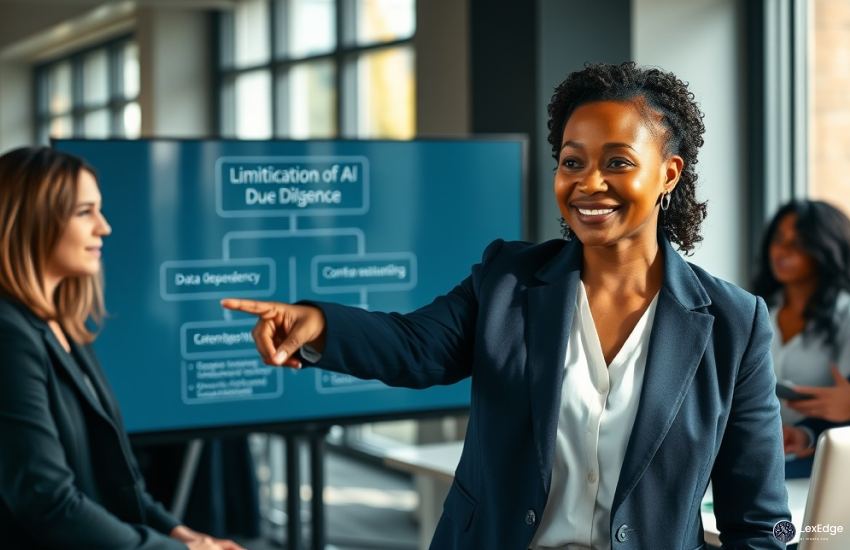AI-Driven Due Diligence: Advantages and Limitations

AI has revolutionized traditional due diligence by automating data analysis, identifying risks faster, and improving decision-making accuracy. While it accelerates processes and reduces costs, challenges such as incomplete data, ethical compliance, and the need for human judgment persist. The future lies in hybrid models that combine AI’s efficiency with human expertise, ensuring a smarter and more reliable approach to risk management.
The Critical Role of Due Diligence in Modern Business

In today’s fast-paced business environment, due diligence plays a vital role in ensuring informed and secure business decisions. It involves a thorough investigation of a company or asset before finalizing a transaction or partnership, helping organizations safeguard investments, maintain regulatory compliance, and identify potential red flags that could impact deals or reputations. However, with the growing volume and complexity of digital data, traditional manual due diligence has become increasingly time-consuming, error-prone, and inefficient. As businesses handle more information than ever, the need for AI-driven due diligence has emerged to improve accuracy, efficiency, and speed in risk assessment and decision-making.
From Manual Reviews to Machine Intelligence The Evolution of Due Diligence

Historically, due diligence was a slow and labor-intensive process, requiring teams of analysts to manually review large volumes of documents and data. This traditional approach often led to delays and inconsistencies. Today, the rise of AI and machine learning has revolutionized this process, enabling organizations to analyze massive datasets within seconds. These technologies can identify hidden patterns, detect potential risks that humans might overlook, and provide real-time monitoring for ongoing compliance and risk assessment. The shift to AI-driven due diligence not only enhances accuracy and efficiency but also empowers businesses to make faster, data-informed decisions.
Core Advantages of AI-Driven Due Diligence

AI technologies offer several transformative advantages in the due diligence process, making it faster, smarter, and more reliable. First, they deliver exceptional efficiency and speed, reducing manual review times from weeks to just minutes—significantly accelerating deal timelines. Second, through enhanced accuracy and risk detection, machine learning algorithms can identify anomalies and ensure that no critical details are missed. Third, AI-driven data analysis integrates diverse information sources, providing a comprehensive and holistic view of target entities. Additionally, automation helps reduce costs by minimizing the need for large analytical teams. Finally, continuous monitoring and real-time updates enable ongoing risk assessment, allowing organizations to stay proactive and informed in an ever-changing business landscape.
Real-World Impact A Case Study

Aseel, a leading real estate crowd-investing platform in Saudi Arabia, successfully implemented AI-powered due diligence to optimize its operations. The integration led to an impressive 87% reduction in onboarding time, significantly improving efficiency and compliance processes. Moreover, Aseel experienced a remarkable 250% growth acceleration, highlighting how AI-driven insights and real-time risk management capabilities can transform business performance. This case study demonstrates the tangible benefits of leveraging artificial intelligence in due diligence to enhance accuracy, speed, and strategic decision-making.
Limitations and Critical Challenges

Despite its many advantages, AI-driven due diligence also comes with certain limitations and challenges, including:
- Incomplete Data – Gaps or missing information can lead to inaccuracies and unreliable assessments.
- Overreliance on Algorithms – Sole dependence on AI may overlook the nuanced insights that human judgment provides.
- False Positives and Negatives – AI systems can misclassify risks, affecting decision-making accuracy.
- Data Privacy and Cybersecurity Risks – Sensitive data must be securely managed to prevent breaches and ensure compliance.
- Evolving Legal and Ethical Standards – Staying compliant with rapidly changing regulations is essential for responsible AI use.
Emerging Trends and Future Directions

Noteworthy trends in AI-driven due diligence include:
- Continuous Learning Capabilities – AI models are evolving to learn and adapt from new data, improving accuracy over time.
- Human-AI Collaboration – Combining human expertise with AI-driven analysis ensures balanced and insightful due diligence outcomes.
- Expansion Across Industries – AI applications are growing beyond finance into sectors like healthcare, real estate, and supply chain management.
- Advanced Relationship Mapping Tools – Modern AI systems now enable detailed risk mapping and compliance tracking across complex business networks.
Conclusion
AI-driven due diligence is reshaping modern business operations by bringing precision, efficiency, and scalability to complex risk evaluations. However, human oversight remains crucial to interpret nuanced insights and ensure ethical standards. Companies that strategically integrate AI into their due diligence frameworks will stay ahead in an increasingly data-driven and competitive landscape.

